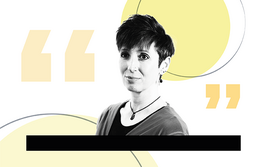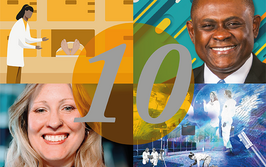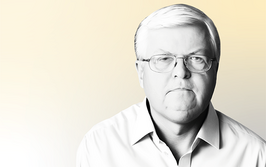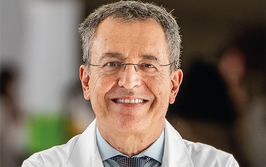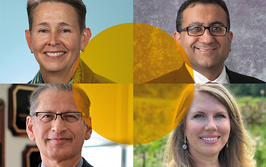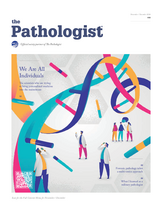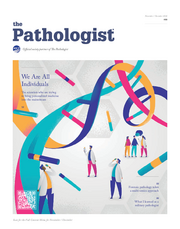Peer-to-Peer: Ivan Damajanov Interviews Fernando Schmitt
The many successes of a surgical pathology and cytology hybrid career
Ivan Damjanov | | 10 min read | Interview
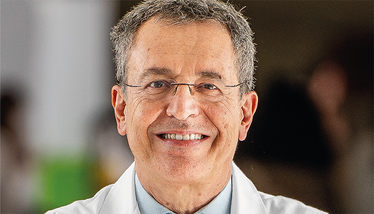
Credit: Fernando Schmitt
Fernando Schmitt received his MD degree from the Medical Faculty of the Federal University of Santa Maria, Brazil, and completed his pathology training and PhD at the Medical Faculty of Botucatu. Over the years, Schmitt has held academic positions at the University of São Paulo, University of Toronto, and Karolinska Medical Hospital. He also served as Director of the Department of Medicine at the Laboratoire National de Santé in Luxembourg.
Currently, Schmitt is a Professor of Pathology at the University of Porto, Director of RISE (Clinical and Translational Research Network), and Head of Molecular Pathology at IPATIMUP. Alongside this, Schmitt is the President of the International Academy of Cytology (IAC), previously leading the International Society of Breast Pathology, and remains the Editor-in-Chief of Pathobiology, serving on several editorial boards, including the WHO-IAC Classification of Tumors.
Schmitt’s research focuses on molecular markers and therapeutic targets in breast cancer – particularly using cytological material. Throughout his career he’s authored over 500 peer-reviewed papers, 33 book chapters, and edited six books.
Ivan Damjanov sat down with Schmitt to learn more about his success in cytology and how he manages a hybrid career.
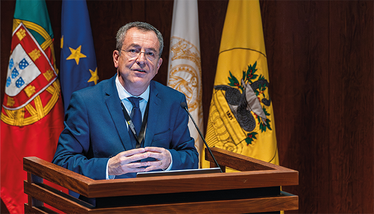
Credit: Fernando Schmitt
What initially sparked your interest in pathology?
I decided to become a pathologist because of my inspiring professors – Carlos Renato Melo, Ivani Spezia Melo, and Marília Cechella – at the Federal University of Santa Maria’s School of Medicine in Santa Maria, Brazil. They opened my eyes to this beautiful speciality and I’ve never regretted my choice to go down this path.
My father was a physician specializing in rheumatology, and my mother dreamed that I would take over his clinic. Initially, she was disappointed by my choice, saying, “So much studying, and in the end, you're not even going to be a doctor!” But as time went on, she became proud of my career.
Pathology wasn’t popular in Brazil at the time, but I remained confident in my decision. After graduating, I traveled over 1,000 kilometers to complete my residency at the prestigious School of Medicine at Botucatu, where Marcello Franco and Mário Rubens Montenegro played pivotal roles in my development.
Many South American pathologists take additional training in the US – was there a specific reason you decided to train in Portugal, and do you believe this was the correct decision?
It’s an interesting story. I was one of the first in my department in Brazil not to pursue a postdoc in the US. After finishing my PhD, I had a scholarship lined up to study breast pathology in the US. Around that time, my department invited Manuel Sobrinho Simões as a visiting professor. I was assigned to accompany him during his visit and we spent a lot of time together.
During one conversation, given some family circumstances, he convinced me that moving to Portugal would be a great opportunity. He explained, "We don't have a research group in breast pathology in Porto, and if you come, you'll have the chance to create one, rather than joining an established production line in America". I took his advice, and it turned out to be one of the best professional and personal decisions I’ve made.
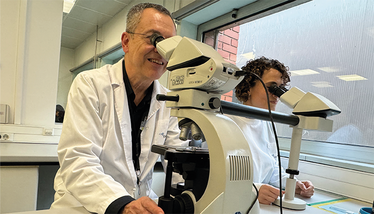
Credit: Fernando Schmitt
What was the clinical cytology presence in Porto when you first arrived?
When I arrived in Porto, I already had a strong foundation in cytology. This is thanks to my fellowship at the Karolinska Institute, where I trained with experts such as Torsten Lowhagen, Lambert Skoog, and Edneia Tani. My background and training made it easy to work with local cytology professionals and help the field grow in Portugal. I established an outpatient clinic for aspiration cytology led by cytopathologists, which still operates today.
I was elected President of the Portuguese Society of Cytology twice and organized the European Congress of Cytology in Lisbon in 2009. With incredible support from my Portuguese colleagues, the congress is still remembered as one of the best European cytology congresses.
You started by practicing surgical pathology and cytology in parallel – do you still divide your time between the two equally?
Yes, I’ve always practiced both cytology and surgical pathology in parallel, and I believe it’s essential to do both. There’s now a growing emphasis on having the same person report on both cytology and small biopsies, especially in cases like lung pathology, where they often go hand-in-hand. Despite limited time, I still perform aspiration biopsies and keep in contact with patients.
I’ve always enjoyed doing biopsies and interacting with patients. When you perform the biopsy, see the patient, and review the images, interpreting the slides becomes much easier.
Growing up in Brazil, did you ever envision yourself as the President of the IAC – or even know of the IAC?
No, I never imagined I’d be where I am today. During my residency in anatomical pathology, I became interested in cytology, and it was then that I learned about IAC for the first time. However, at that time, it seemed like something so distant and unattainable, that I did not even dream about becoming an officer of the society.
What are your duties as IAC President and how much of your schedule do they occupy?
I’m responsible for overseeing the entire administrative structure of the organization and appointing leaders of the various committees that implement educational, scientific, and administrative policies. Alongside this, I’m also in charge of developing a strategic plan for the Academy. Before becoming president, I served as the Secretary-General of the IAC for 10 years, performing administrative tasks and implementing ideas and initiatives of the presidents, which made the transition to my current position more manageable. It is difficult to say exactly how much time I spend on my presidential duties, but they consume a considerable amount of time, which I have to accommodate alongside my daily responsibilities.
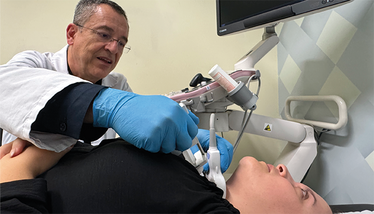
Credit: Fernando Schmitt
Can you tell us about some of your achievements as IAC President so far?
Before my presidency, I organized a strategic meeting with IAC board members, as well as representatives from surgical and molecular pathology, surgery, epidemiology, and pathology residents. The goal was to define expectations for cytology’s role in patient care and develop methods to improve teaching and training.
Following the meeting, I created a strategic plan which is now underway. One of these key accomplishments is strengthening education and training through digitizing the IAC International Board of Cytotechnology and Cytotechnologist exams – increasing access without the requirement for slides and microscopes. This is particularly supportive of researchers in remote locations. Alongside this, we’re expanding resources online – such as tutorials and webinars – while preparing for the 2025 International Cytology Congress in Florence.
Another accomplishment I’m proud of is the foundation we’ve established to fund scholarships for residents and young specialists, supporting their attendance at conferences and training in accredited centers. Perhaps even more importantly is the partnership we’ve created with IARC-WHO, publishing "WHO Reporting Systems for Cytopathology" books, globalizing cytopathology to the level of surgical pathology. The lung and pancreas volumes are already published, with more in progress.
And finally, but no less importantly, is the launch of a “Research Corner” to promote cytology research on Twitter/X and LinkedIn. I hope that promoting the speciality and supporting the next generation will increase the numbers of our future leaders.
You’re also the head of Molecular Pathology at IPATIMUP and director of RISE (Clinical and Translational Research Network). How do you find time for all these assignments and responsibilities?
It’s certainly a challenge! The secret lies in building a good support network and, thankfully, both at RISE and IPATIMUP, my colleagues are highly dedicated and competent, which saves me a lot of time as they assist greatly with day-to-day tasks. My secretary is also very efficient, prioritizing my most urgent tasks and allowing me to still carve out time to be with family – an essential element for maintaining mental balance.
Can you tell us about your role as a standing member of WHO-IAC Classification of Tumors?
Certainly! To provide some background: in September 2019, the IAC President and Secretary-General proposed to the head of WHO’s Tumor Classification (commonly known as the “blue books”) that the International Agency for Research on Cancer (IARC) publish a series of cytology reporting systems. After several discussions, a memorandum of understanding was signed in May 2020 between the IAC, IARC, and WHO to promote standardized terminology and diagnostic criteria in cytology. The goal was to leverage cancer cytology expertise to create international reporting systems to improve patient care.
Partnering with IARC offered several benefits, including establishing a consistent approach to cytology reporting in both digital and printed formats, ensuring rapid production of each volume in sync with the updated “blue books,” typically completed in 12-18 months. Each volume, accessible online with additional images, increases the reach and impact of cytology.
To oversee this series, a Standing Board was formed, including the head of WHO’s Tumor Classification and four cytopathologists from different continents, jointly appointed by the IAC and WHO. I am honored to serve on this board. Our responsibilities include coordinating the series, defining reporting system structure and categories, and finalizing content through collaborative discussions with global experts.
You’re also a well-known world-wide lecturer – do you enjoy this aspect of your career or is the travel more of a hindrance?
It's been incredibly rewarding. Through academic recognition and invitations, I’ve had the chance to visit over 60 countries across five continents – opportunities I wouldn’t have had on a professor’s salary alone! Recognition leads to more invitations, but it all started with my first international presentation at a cytology congress in Buenos Aires, building gradually from there.
Invitations often come as people recognize your work through publications, which is why publishing is so valuable to establish respect and visibility among peers. Now, I find myself tiring from long travel days, choosing to spend more time at home. I look forward to seeing a new generation of young professionals emerging to take my place.
You’ve received many awards during your career, is there one in particular that means the most to you?
Every award I’ve received has been meaningful, but the 2013 Goldblatt Award from the International Academy of Cytology stands out, especially given past winners like Leopold Koss, Josef Zajicek, and Volker Schneider, who are true pioneers in cytology. I’d also like to highlight the Merit Award from the Portuguese League Against Cancer, which recognized my career in breast pathology and contributions to the field.
Any plans for the next few years and beyond?
In the next few years, my priority is to establish RISE as a recognized clinical research center with strong funding to support clinical research in Portugal. Building RISE into a robust entity with international partnerships will allow me to eventually hand over its directorship focused on continued growth.
I also want to encourage younger members of our pathology department to step into leadership roles. My goal is to bridge the gap between generations before I retire, ensuring young pathologists feel motivated, have good working conditions, and re-engage with academic life.
On a personal level, I hope to maintain good health, keep up with walking and sports, and perhaps find a peaceful retreat outside the city. I still plan to travel, but more for leisure than work.
What advice do you have for the next generation of hybrid pathology-cytology students hoping to follow in your steps?
I’d advise the next generation to embrace the strength of both fields. Pathology and cytology are interconnected and, together, provide a comprehensive understanding of disease processes. Curiosity and an openness to learning are crucial, whether you’re reviewing cytology slides or performing surgical pathology. Don’t hesitate to take on challenges, whether that means moving to a new country or exploring new research areas.
Success isn’t always straightforward, and setbacks like article rejections are part of the journey. Many people give up after a rejected article, but rejection is a learning opportunity – if you take criticism constructively and persist, the results are often positive. Use criticism and persistence to grow and improve.
Inspiration can come from anywhere, particularly in the face of clear objectives and a drive to work through something “impossible”. No matter your background, university, or country, a successful international academic career is possible with determination, collaboration, and the humility to recognize and learn from mistakes.
And finally, but most importantly, surround yourself with supportive mentors and colleagues who can guide you. A hybrid career can be demanding, but with dedication, teamwork, and passion, it’s highly rewarding. Remember to balance your professional goals with personal well-being, and remember the importance of family, friends, and a healthy lifestyle.
Professor Emeritus of Pathology at the University of Kansas, Kansas City, USA.

